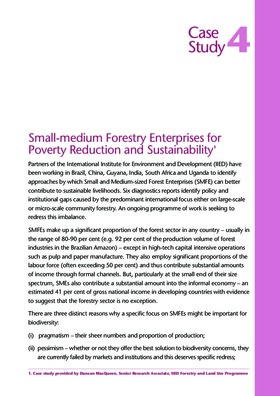127 Case Study 4 Small-medium Forestry Enterprises for Poverty Reduction and Sustainability
Document begins: 127 Case Study 4 Small-medium Forestry Enterprises for Poverty Reduction and Sustainability1 Partners of the International Institute for Environment and Development (IIED) have been working in Brazil, China, Guyana, India, South Africa and Uganda to identify approaches by which Small and Medium-sized Forest Enterprises (SMFE) can better contribute to sustainable livelihoods. Six diagnostics reports identify policy and institutional gaps caused by the predominant international focus either on large-scale or micro-scale community forestry. An ongoing programme of work is seeking to redress this imbalance. SMFEs make up a significant proportion of the forest sector in any country usually in the range of 80-90 per cent (e.g. 92 per cent of the production volume of forest industries in the Brazilian Amazon) except in high-tech capital intensive operations such as pulp and paper manufacture. They also employ significant proportions of the labour force (often exceeding 50 per cent) and thus contribute substantial amounts of income through formal channels. But, particularly at the small end of their size spectrum, SMEs also contribute a substantial amount into the informal economy an estimated 41 per cent of gross national income in developing countries with evidence to suggest that the forestry sector ...
Cite this publication
Available at https://www.iied.org/g00429
